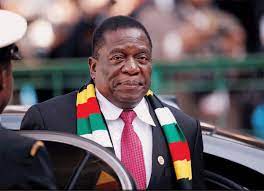Mnangagwa Secret Plan Exposed
Alarming reports have emerged of a potential move by members of Zimbabwe’s ruling party, Zanu PF, to push for legislation aimed at banning opposition parties in the country.
The Zanu PF group known as Varakashi, operating under the banner of “Operation Restore Legacy,” has ignited controversy with their call for parliamentarians to enact such a law.
In a statement released on Monday via their Facebook page, Operation Restore Legacy, Zanu PF Varakashi made their intentions clear: “With the 2/3 majority that ZANU PF has in Parliament, I am challenging legislators to enact a law that bans the opposition. Since its inception, the opposition has done more harm, invited sanctions, looted public resources, plagued service delivery, focused on petty fights.”
This brazen call to action has sparked outrage and condemnation from across the political spectrum, with critics decrying it as a direct assault on democracy and pluralism in Zimbabwe.
The notion of banning opposition parties not only runs counter to fundamental democratic principles but also raises concerns about the erosion of political freedoms and human rights in the country.
Opposition leaders and civil society groups have vehemently opposed the proposed legislation, arguing that it would amount to a grave violation of citizens’ rights to freedom of expression, association, and participation in the democratic process.
They warn that silencing dissenting voices and monopolizing political power would only serve to entrench authoritarianism and undermine the legitimacy of Zimbabwe’s governance system.
Furthermore, the allegations made by Zanu PF Varakashi regarding the opposition’s supposed role in inviting sanctions, looting public resources, and obstructing service delivery are unsubstantiated and politically motivated.
Such rhetoric not only seeks to demonize political opponents but also deflect attention from the ruling party’s own accountability and governance failures.
The push to ban opposition parties comes at a time of heightened political tensions in Zimbabwe, exacerbated by economic challenges, social unrest, and a lack of trust in state institutions.
Instead of fostering genuine dialogue and reconciliation, this divisive proposal threatens to further polarize society and deepen divisions along political lines.In response to the alarming developments, international observers and the broader global community have expressed concern about the state of democracy and human rights in Zimbabwe. Calls for respect for democratic norms, rule of law, and inclusive political participation have intensified, underscoring the need for Zimbabwean authorities to uphold their obligations under international law.
As Zimbabwe stands at a crossroads, facing critical decisions about its political future, it is imperative that all stakeholders prioritize dialogue, tolerance, and respect for democratic principles.
The attempt to ban opposition parties represents a dangerous regression and must be firmly opposed in defense of democracy, accountability, and the rights of all Zimbabweans. ZimEye



